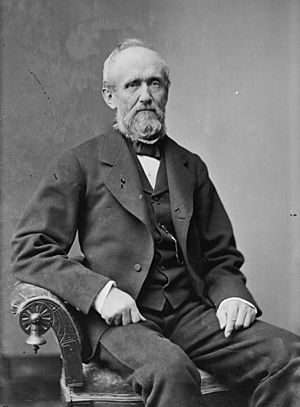D. Wyatt Aiken facts for kids
Quick facts for kids
David Wyatt Aiken
|
|
|---|---|
 |
|
| Member of the U.S. House of Representatives from South Carolina's 3rd district |
|
| In office March 4, 1877 – March 3, 1887 |
|
| Preceded by | Solomon L. Hoge |
| Succeeded by | James S. Cothran |
| Member of the South Carolina House of Representatives from Abbeville District | |
| In office November 28, 1864 – December 21, 1866 |
|
| Personal details | |
| Born | March 17, 1828 Winnsboro, South Carolina |
| Died | April 6, 1887 (aged 59) Cokesbury, South Carolina |
| Resting place | Magnolia Cemetery, Greenwood, South Carolina |
| Political party | Democratic |
| Profession | journalist, farmer |
| Military service | |
| Allegiance | |
| Branch/service | |
| Years of service | 1861–64 |
| Rank | |
| Commands | |
| Battles/wars | American Civil War - Peninsula Campaign - Northern Virginia Campaign - Battle of Antietam - Gettysburg Campaign |
David Wyatt Aiken (born March 17, 1828 – died April 6, 1887) was a farmer and journalist. He was an officer in the Confederate States Army during the American Civil War. After the war, he served five terms as a U.S. Congressman for South Carolina.
Contents
David Wyatt Aiken's Life
Early Years and Education
David Wyatt Aiken was born in Winnsboro, South Carolina. He received his early education from private teachers at home. He later attended the Mount Zion Institute in Winnsboro. In 1849, he graduated from South Carolina College in Columbia.
After college, he taught for two years. In 1852, he married Mattie Gaillard. He then started working in farming. He owned a large farm, known as a plantation. He also traveled a lot in Europe and the United States. He spoke to many people about the Southern way of life.
Later, he became the editor of the Winnsboro News and Herald newspaper. He married a second time to Miss Smith. He then moved to Abbeville, South Carolina, where he continued to farm. In 1855, Aiken helped start the State Agricultural Society. His plantation had about 40 people working on it.
Service During the Civil War
In 1858, Aiken attended a political meeting in Mobile, Alabama. He began speaking publicly about states leaving the United States. When South Carolina left the Union and the Civil War began, Aiken joined the Confederate Army. He started as a private in the 7th South Carolina Infantry.
Later, he became an officer in his army unit. In 1862, he was chosen to be a colonel. He led his unit in the Peninsula Campaign and the Northern Virginia Campaign. In September 1862, he was seriously injured at the Battle of Antietam. He was shot through his lungs.
After a long recovery, he led his unit again. This was during the Gettysburg Campaign. His unit fought near the Peach Orchard in the Battle of Gettysburg. However, his injury continued to bother him. This forced him to take on office work in Macon, Georgia for a year. He left the Confederate army in mid-1864 and went home.
Political Career and Activism
From 1864 to 1866, Aiken was a member of the South Carolina House of Representatives. In 1869, he served as secretary and treasurer of the State Agricultural and Mechanical Society of South Carolina.
During the Reconstruction period, Aiken was an important figure in the Democratic party. He worked to change voting laws.
In 1872, Aiken became active in a group called The National Grange of the Order of Patrons of Husbandry, or the Grange. He helped start 76 local Grange groups in South Carolina. He was on the executive committee of the National Grange from 1873 to 1885. In 1875, he was the chairman. He was also president of the South Carolina Grange from 1875 to 1877.
Starting in 1869, Aiken wrote for The Rural Carolinian. This was a magazine for farmers in the South. He later became the editor and owner of the magazine. He held these jobs until 1877.
Congressional Service and Later Life
In 1876, Aiken was a representative at a big meeting for his political party. This was the Democratic National Convention in St. Louis. He was then elected as a Democrat to the Forty-fifth Congress. He served four more terms after that. He was a Congressman from 1877 until 1887.
He was the chairman of the Committee on Education in the Forty-eighth and Forty-ninth Congresses. His health began to decline during his last term in office. Because of this, he did not run for re-election in 1886.
David Wyatt Aiken died in Cokesbury, South Carolina. He was buried in Magnolia Cemetery in Greenwood, South Carolina.
His son, Wyatt Aiken (1863–1923), also served in Congress. His first cousin, William Aiken, Jr., became a Congressman and Governor of South Carolina.
 | James B. Knighten |
 | Azellia White |
 | Willa Brown |

